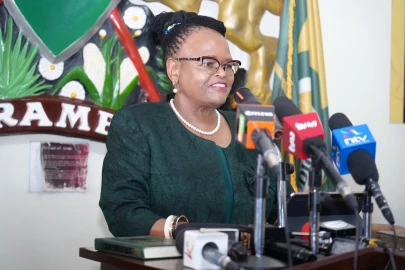- Koome called on judicial officers to remain resolute and impartial in discharging their duties, even as she asked the Executive and political leaders to respect and allow courts to operate independently.
- She encouraged courts to exercise discretion in bail and bond decisions with fairness, proportionality, and balance to ensure justice for all.

Chief Justice Martha Koome has pushed back against external interference and attacks on judicial officers by the political class.
Koome, who is the chair of the National Council on the Administration of Justice (NCAJ), called on judicial officers to remain resolute and impartial in discharging their duties, even as she asked the Executive and political leaders to respect and allow courts to operate independently.
NCAJ issued a statement reaffirming the independence of the Judiciary, urging that it must be upheld at all times, days after President William Ruto criticised a court ruling that barred police from erecting roadblocks.
The council encouraged courts to exercise discretion in bail and bond decisions with fairness, proportionality, and balance to ensure justice for all.
It also called on independent commissions to operate strictly within their constitutional mandates.
“The independence of the Judiciary must be upheld. Courts are encouraged to exercise discretion in bail and bond decisions with fairness, proportionality, and balance,” said Koome.
“The independence of other constitutional commissions and independent offices must be upheld to enable them to undertake their mandate effectively.”
The council also called on the police to maintain law and order with professionalism, proportionality, and respect for human rights, urging full compliance with constitutional safeguards and alignment with human rights principles.
“All security operations must comply with constitutional safeguards in line with human rights principles,” noted Koome.
Amid reported cases of sexual violence, the council urged the police to ensure the safety and dignity of women, children, and other vulnerable groups.
It stressed the need for immediate arrests and decisive action in response to the rising number of sexual violence cases reported during recent protests.
“Immediate steps must be taken to address cases of sexual violence that increased during protests,” Koome stated.
The council acknowledged that the protests express the frustrations of the youth and reflect deep-seated governance concerns around service delivery, accountability, employment, and inclusion. It stated that these voices must be heard, understood, and addressed.
“These voices must be heard, understood, and addressed through constructive and lawful means,” she added.
“There should be dialogue, restraint, and mutual respect in moments of national tension and challenges.”
The council also expressed deep concern over inflammatory political rhetoric that undermines the rule of law and risks inciting divisions along ethnic lines.
It warned that Kenya's history serves as a reminder of the grave consequences of political radicalisation and urged all political actors to exercise restraint.
Admitting that there are gaps and challenges in managing public order while upholding the right to assembly and protest, the NCAJ stated its commitment to working with the Kenya Law Reform Commission and other stakeholders to bridge the gap.
“All justice sector institutions reaffirm their commitment to the Constitution and the rule of law as the foundation for peace and national unity,” added Koome.
The council further called for the immediate activation and resourcing of the victim compensation fund by the National Treasury to enable courts to grant compensation orders to victims of violence and wrongful arrests.
©Citizen Digital, Kenya
 6 days ago
220
6 days ago
220


